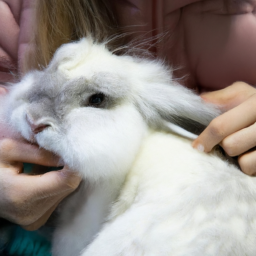As the weather gets colder, you’ll need to take some extra steps to make sure your Angora Rabbit Care hutch is warm and weatherproof. Here are some tips:
Table of Contents
1. Winterizing your Angora Rabbit’s Hutch
- Add extra bedding. Angora rabbits are very sensitive to cold, so make sure they have plenty of straw or hay to burrow into.
- Move the hutch to a sheltered spot. If possible, put the hutch under a tree or against a wall to protect it from wind and rain.
- Cover the hutch. Use a tarp or old blanket to cover the top and sides of the hutch, making sure the openings are still well-ventilated.
- Check the water. Make sure the water bottle is full and not frozen. You may need to change it more often in cold weather.
By following these steps, you can help your Angora rabbit stay warm and comfortable all winter long!
2. Providing Extra warmth for your Angora Rabbit
As the weather gets colder, you may be wondering how to keep your Angora rabbit warm. Here are a few tips to help you provide extra warmth for your furry friend.
- Bring your rabbit inside. If it’s too cold for you outside, it’s probably too cold for your rabbit too. Bring them inside and put them in a warm, draft-free room.
- Give them a warm bed. Make sure your rabbit has a warm, comfortable place to sleep. You can use a heated pet bed or make a DIY bed out of a cardboard box lined with a towel or blanket.
- Dress them in a sweater. If your rabbit is resistant to coming inside, you can try dressing them in a sweater or coat to help keep them warm. Just make sure the clothing is not too tight and does not have any loose strings or buttons that your rabbit could get caught in.
- Add a heat lamp. If your rabbit is still cold, you can try adding a heat lamp to their enclosure. Make sure the lamp is not too close to your rabbit and that there is no chance of them getting burned.
- Give them extra hay. Hay is a great way to help your rabbit stay warm. It’s also a good source of fiber and helps keep their digestive system healthy.
By following these tips, you can help keep your Angora rabbit warm and comfortable all winter long.
3. Feeding your Angora Rabbit in winter
When the temperature starts to drop and winter sets in, you may be wondering how to best care for your Angora rabbit. After all, these furry creatures are known for their delicate coats, which can be easily damaged by the cold weather.
Here are a few tips on how to keep your Angora rabbit well-fed and healthy during the winter months:
- Make sure to provide plenty of hay. Hay is an important part of an angora rabbit’s diet, and it should be available at all times. Not only does hay provide essential nutrients, but it also helps keep the rabbit’s digestive system healthy.
- Provide a variety of fresh vegetables. In addition to hay, your Angora rabbit needs a diet that includes fresh vegetables. Some good options include carrots, broccoli, and cabbage.
- Avoid giving your rabbit too much food. It’s important not to overfeed your Angora rabbit, as this can lead to health problems. A good rule of thumb is to offer 1/4 cup of food per pound of body weight.
- Make sure the rabbit has access to fresh water. Just like any other animal, rabbits need plenty of fresh water to stay hydrated. Be sure to check the water bowl regularly to make sure it hasn’t frozen over.
- Provide a warm, dry place to sleep. Angora rabbits are sensitive to cold weather, so it’s important to provide them with a warm, dry place to sleep. A good option is a heated dog bed, but you can also use a regular bed with an extra layer of blankets.
By following these tips, you can help ensure that your Angora rabbit stays healthy and happy all winter long!
4. Grooming your Angora Rabbit in winter
Angora rabbits are a special breed of rabbit that is known for its long, soft fur. Angora rabbits need to be groomed regularly to keep their fur from matting and to prevent skin problems. Grooming your Angora rabbit in winter can be a bit more challenging than during other times of the year, but it is still possible to do it safely and effectively.
Here are a few tips for grooming your Angora rabbit in winter:
- Use a metal comb: A metal comb is the best tool for combing out your Angora rabbit’s fur. Be sure to use a comb that has wide teeth spaced far apart. This will help to avoid damaging your rabbit’s delicate fur.
- Be careful of the cold: When grooming your Angora rabbit in winter, be careful of the cold. Avoid using water that is too cold and be sure to keep your rabbit warm after the grooming session is over.
- Be gentle: Angora rabbits have delicate fur and skin. Be sure to be gentle when combing and brushing your rabbit. Avoid pulling on the fur and be careful not to scratch the skin.
- Try not to groom too often: Grooming your Angora rabbit too often can actually damage the fur. Typically, engaging in this activity once or twice weekly is generally deemed satisfactory. If you must groom more often, be sure to use a wide-toothed comb and be extra gentle.
By following these tips, you can safely and effectively groom your Angora rabbit in winter.
5. Winter Health Concerns for Angora Rabbits
When the temperature starts to drop, angora rabbits need a little extra care to stay healthy. Here are five winter health concerns for Angora rabbits to watch out for:
1. Pneumonia
Pneumonia is a serious respiratory infection that can be fatal for rabbits. Symptoms include wheezing, sneezing, and difficulty breathing. If your rabbit has any of these symptoms, take them to the vet immediately.
2. Gastrointestinal Stasis
Gastrointestinal stasis is a condition in which the digestive system slows down or stops working altogether. This can be caused by a number of things, including a change in diet, stress, or a lack of exercise. Symptoms include a decrease in appetite, soft stools, and weight loss. If your rabbit is showing any of these symptoms, take them to the vet right away.
3. Urinary Tract Infections
Urinary tract infections are relatively common in rabbits and can be very serious. Symptoms include increased urination, straining to urinate, and blood in the urine. If you think your rabbit may have a urinary tract infection, take them to the vet immediately.
4. Hypothermia
Hypothermia is a condition in which the body temperature drops below normal. Symptoms include shivering, lethargy, and weakness. If your rabbit is showing any of these symptoms, take them to the vet right away.
5. Frostbite
Frostbite is a condition in which the skin and tissue freezes. Symptoms include pale or blue skin, cold skin, and pain. If you think your rabbit has frostbite, take them to the vet immediately.
By keeping an eye out for these five winter health concerns, you can help keep your angora rabbit healthy and happy all season long.







